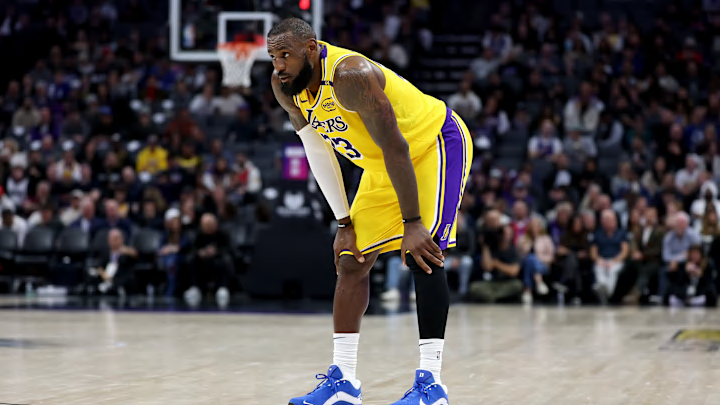The Los Angeles Lakers have officially entered uncharted territory. They're consistently fighting off a dip below the .500 line, but the process of overcoming a tumultuous first third of the 2024-25 season has been defined by uncertainty surrounding the most consistent player in NBA history.
As the Lakers weigh their options and evaluate the best path toward sustainable success, an unlikely decision is staring them directly in the face.
LeBron James entered his 22nd NBA season with a remarkable amount of momentum. He was the MVP of the 2024 Summer Olympics in Paris, guiding Team USA to a gold medal that few expected him to play such a significant role in winning at 39 years of age.
Unfortunately, James has struggled to maintain his usual level of all-around quality during the 2024-25 NBA regular season.
The numbers look great. He's averaging 22.6 points, 9.0 assists, 7.9 rebounds, and 2.0 three-point field goals made per game while maintaining an impressive level of efficiency with a slash line of .486/.362/.748.
Beyond the individual production, however, is a pending realization that the best option for James may be slightly decreasing his playing time and thus improving his form on defense.
Fewer minutes could lead to a bigger impact from LeBron James
James is the epitome of longevity and one of the few athletes against whom Father Time hasn't yet won his endless war. He's maintained a remarkable level of production for 22 years, and even as his scoring has declined in 2023-24, he's yet again flirting with a nightly triple-double.
James' defensive consistency has been at a career low, however, and the Lakers can no longer avoid that haunting reality.
Los Angeles is currently allowing a team-worst 116.3 points per 100 possessions when James is on the court. That number drops to a team-best 106.5 when he isn't—a 9.8-point difference and a clear example of what's gone wrong in 2024-25.
James is still capable of dissecting a defense and making plays that most superstars could only dream of, but the Lakers aren't a strong enough defensive team to support his quality on that end.
A potential resolution could be decreasing James' minutes to increase the per-minute output he's able to provide. It may lead to a slight decline in his offensive production, but it could offset the defensive concerns by allowing him more time to rest within games.
This isn't to say that the Lakers need to cut his playing time in half, nor anything near it, but his current average of 35.0 minutes per game hasn't lent itself to two-way value.
By dropping that number closer to 30 minutes per contest, Los Angeles would give James a chance to expend more energy when he's on the court and improve his odds of having a superstar-level postseason. Questions would inevitably arise about who could pick up the additional minutes, but the likes of Dalton Knecht and an improving Max Christie could certainly use the additional playing time.
Perhaps James will turn back the clocks and provide improved quality on defense regardless, but if that doesn't happen organically, slightly decreasing his playing time could be the answer.
